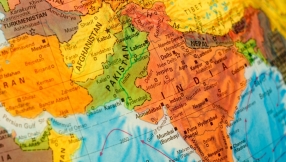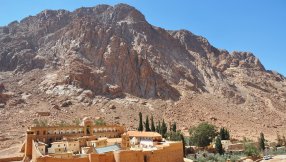Coptic leader apologises for bishop's Koran remarks in Egypt
Last week, Bishop Bishoy sparked outrage when he was quoted by the Al-Masry Al-Youm newspaper as saying that "Muslims are only guests" in the country. Bishoy was also quoted in the Egyptian media for wondering about the time frame for the revelation of the Koranic verses disputing the divine nature of Jesus Christ.
The bishop reportedly said these verses were inserted by one of the Prophet Muhammad's successors after his death. Muslims believe that Muhammad received all verses through the Archangel Gabriel during his lifetime and they are the immutable word of God.
In an interview with Egypt’s news agency, Pope Shenouda III said debating religious beliefs “are a red line, a deep red line”.
"The simple fact of bringing up the subject was inappropriate, and escalating the matter is inappropriate," added Shenouda, whose church body comprises 95 per cent of Egypt’s Christians.
“I'm very sorry that the feelings of our Muslim brothers have been hurt."
On Friday, after the bishop’s remarks were made known, thousands of Muslims demonstrated and Al-Azhar's Islamic Research Center held an emergency meeting to condemn the bishop's statements.
"Such irresponsible statements threaten ... national unity at a time when it is vital to maintain it," said the statement.
Notably, however, the latest row comes just weeks after an Islamic publishing house angered Egypt's Christian community by publishing a "forged Bible" that the Coptic Church said amounted to blasphemy and religious intolerance.
The owner of the Islamic Enlightenment Publishing House, Abuislam Abdullah, wrote in the introduction of the publication that the goal of printing the text was to “prove” there are multiple versions of the Bible and that Christians had “forged theirs”.
In a strange statement, Abdullah also said the version of the Bible his company published was written before the Book of Genesis.
The Coptic Church, in response, demanded the publishing house take the book off the shelves and said it would consider taking legal action if the company did not remove the text from publication. It called the book “extremely offensive”.
Although Egypt's Muslims and Copts generally live in peace, tensions are on the rise over the construction of new churches and reported cases of conversions.
Christians in Egypt claim they are marginalised in society and reportedly suffer from violent forms of abuse. They also lack fair representation in the government, leading to further abuse of the minority group.
Since 2002, Egypt has been on the US Commission on International Religious Freedom’s “Watch List” for its serious religious freedom violations, including widespread problems of discrimination, intolerance, and other human rights violations against members of religious minorities.
According to Egypt’s constitution, Islam is the “religion of the state” and the country's “principle source of legislation”. Egypt’s Christian population, meanwhile, makes up eight to 12 per cent of the overall population.
Still, while small, Egypt’s Christian population stands as the largest Christian community in the Middle East and is also among the oldest. The Apostle Mark reportedly founded the Coptic Church in the first century when he brought Christianity to Egypt. Muslims brought Islam to Egypt six centuries later, after which the country gradually came to be predominantly Muslim.
Today, 90 percent of Egypt's population is Muslim.













